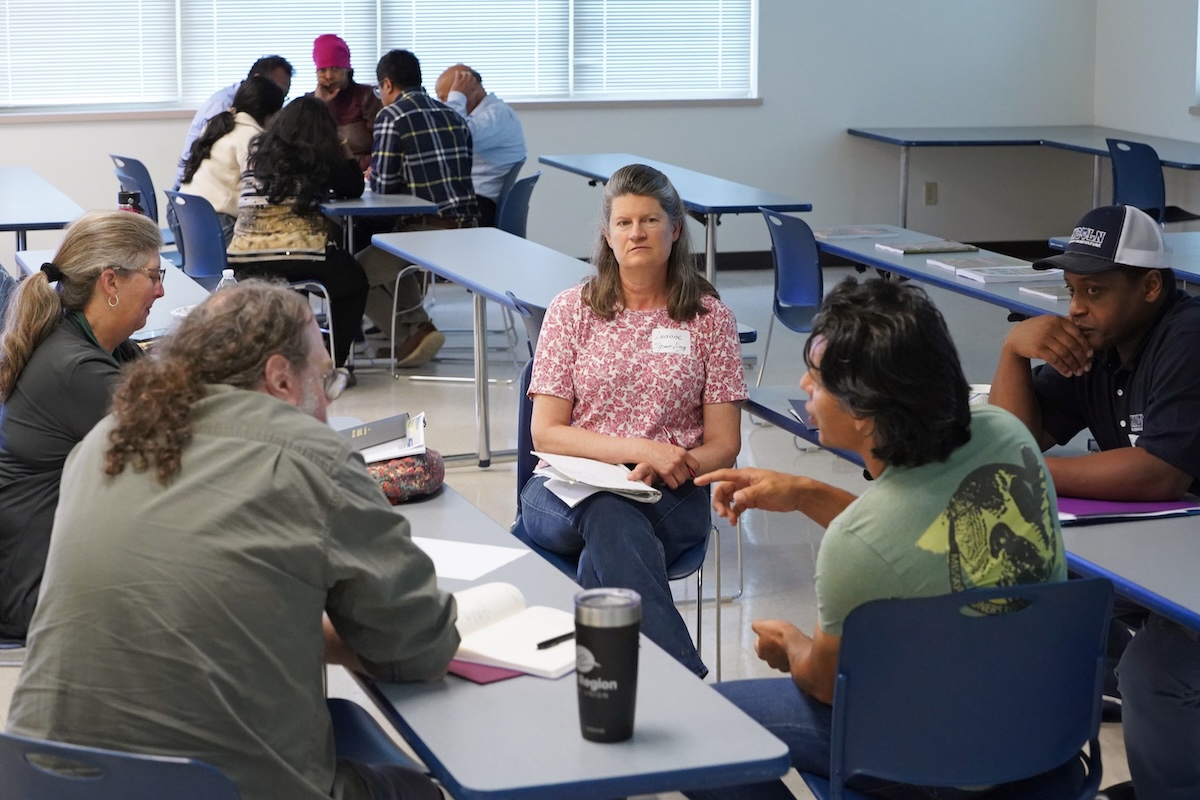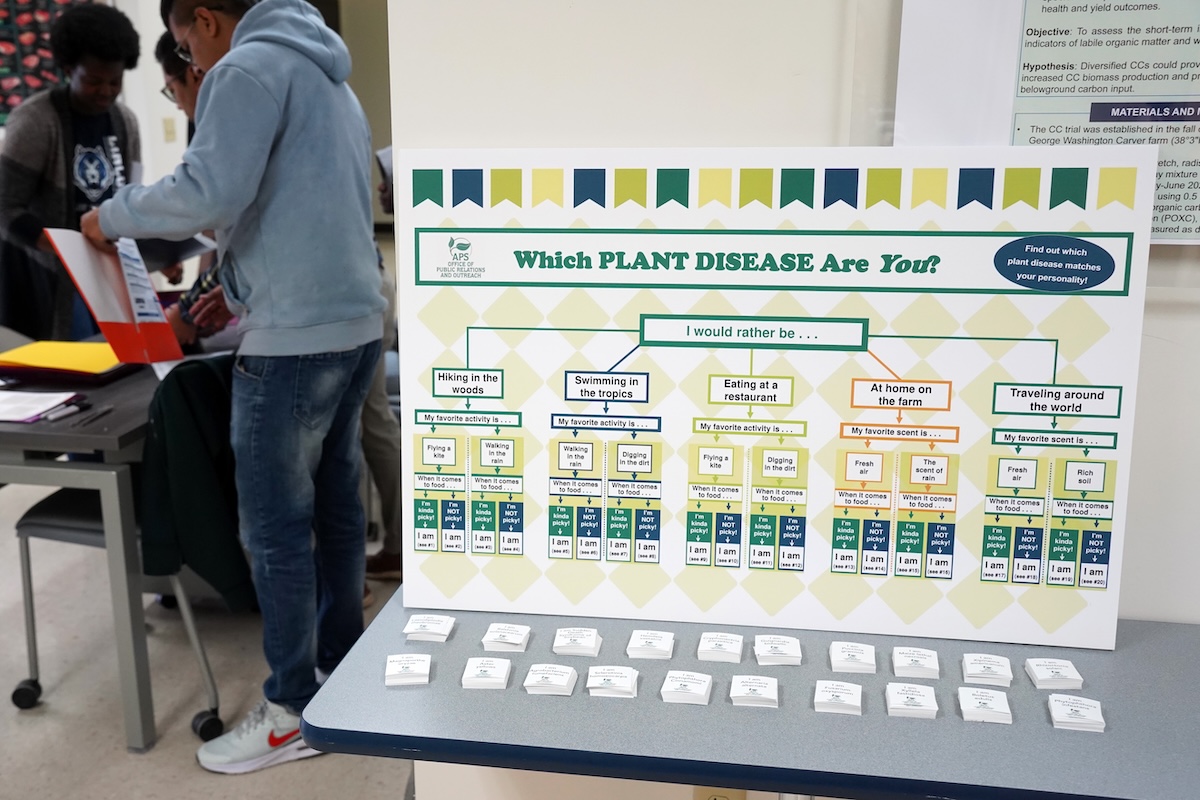Cutting Disease Off at the Root: Learning Circle Teaches to Diagnose and Manage Plant Diseases
Office of Communications and Marketing
Young Hall
820 Chestnut Street
Jefferson City, MO 65101
 During the April 30 soilborne pathogen learning circle, attendees worked together to create and share disease management plans.
During the April 30 soilborne pathogen learning circle, attendees worked together to create and share disease management plans.
Wilting, browning, root rot, seed decay, leaf spots, damping-off — any number of plant diseases can afflict crops.
While these afflictions are easily noticeable, they’re only symptoms of a deeper issue, and many growers don’t know the root causes behind them.
Dr. Waana Kaluwasha, an assistant professor at Lincoln University of Missouri (LU), hosted a learning circle in April to help tackle that issue. Her workshop sought to teach growers and specialists how to identify and treat the soilborne pathogens that cause plant diseases.
Kaluwasha explained to attendees that microorganisms in soil cause plant diseases. These microorganisms can survive for extended periods in soil and crop debris before spreading to plants, and they can live in a broad range of hosts.
They can also be difficult to diagnose, as multiple infections can occur simultaneously with overlapping symptoms.
She discussed how pathogens spread, their life cycle and some of the common diseases they cause.
“Soilborne pathogens cause a variety of diseases that can impact vegetable and fruit quality,” Kaluwasha said. “The occurrence of these pathogens is influenced by several variables and it’s important to understand both their biology and the factors that favor them in order to devise more effective management strategies.”
Dr. Peng Tian, director of the University of Missouri (MU) Plant Diagnostic Clinic, also led a presentation at the workshop. His presentation, “Show Me Your Sick Plants,” explored the reproduction and spread of plant diseases, as well as methods for diagnosing and distinguishing common infections.
He also shared how growers can submit afflicted plants to the MU Plant Diagnostic Clinic, where experts can identify plant diseases and recommend management plans.
As part of the learning circle, attendees broke out into smaller groups and received case studies. Their task was to create action plans for the diseases detailed in the case studies, then share those plans with the rest of the attendees.
 As part of an interactive activity at the April 30 soilborne pathogen learning circle, attendees used a chart to find out which disease they were.
As part of an interactive activity at the April 30 soilborne pathogen learning circle, attendees used a chart to find out which disease they were.
Nearly 30 people attended the learning circle, representing farmers, Cooperative Extension specialists, Lincoln faculty and staff, graduate students and researchers.
One farmer in attendance was Leanne Spurling, who runs Sunny Acres Farm in Callaway County. She produces various fruits and vegetables, including lettuce, onions, potatoes, peppers, persimmons, apples and peaches.
Spurling said she has attended workshops in the past but hasn’t had time to attend many in recent years. She was excited to learn about Kaluwasha’s learning circle because it was local and relatively short, meaning she didn’t have to travel far, and it didn’t take up her entire day.
During the learning circle, Spurling shared that she’s experienced black rot and other plant diseases on her farm. She hoped the workshop could teach her how to better manage black rot and identify the diseases she’s unfamiliar with.
“I wanted to learn more so I can identify more diseases and take action," Spurling said. "Sometimes you keep having issues and don’t understand why. If you can catch it when it’s in the infant stage, you can keep it from spreading or at least change course.”
That idea was the genesis behind the workshop. While plant diseases can be treated, Kaluwasha said it is more effective to prevent diseases from taking root and spreading in the first place.
Kaluwasha said she chose to host the learning circle at this time so growers would think about plant disease prevention and management as the planting season takes off.
The learning circle format was a new experience for Kaluwasha, and she said she was happy with how engaged attendees were. Presentations were interactive, and attendees participated in discussions throughout the workshop, asking questions and sharing their experiences.
Going forward, Kaluwasha wants to include samples in the workshop so attendees can get hands-on and see plant diseases in person. She’s also considering hosting the workshop in other locations so more growers can attend without traveling.
For more information on future soilborne pathogen and plant disease workshops, contact Dr. Waana Kaluwasha at KaluwashaW@lincolnu.edu.
To find other events hosted by Lincoln, visit the university’s calendar at https://www.lincolnu.edu/events/index.html.
